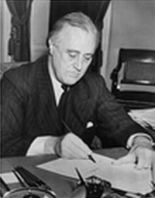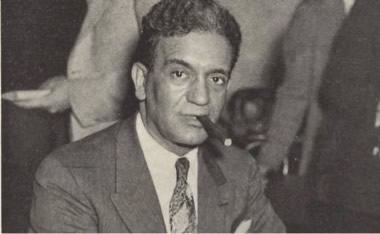This Week in History:
March 27 - April 2, 1933
FDR Re-regulates the Financial System
March 2011
 Franklin D. Roosevelt |
This week, we deal with Franklin Delano Roosevelt's first steps for dealing with re-regulating the U.S. financial system. Having dealt with the immediate bankruptcy crisis when he entered office in March of 1933, the President now had to root out some of the systemic evils which had been built into the banking system, and associated financial institutions, in order to assert the principle of the General Welfare in practice. It is ironic that these measures by FDR, which locked him into a bitter struggle with the highest level of the banking establishment, have been used to get populists today, to attack the President as having been against the common man. It was precisely these measures—which ultimately established the Glass-Steagall Act and the Securities and Exchange Commission—that were required to bring the speculative looters under control.
On March 29, Roosevelt sent to Congress his bill for the regulation of the sale of investment securities in interstate commerce. In his message to Congress, Roosevelt continued his attack on the corrupt financial practices of the private banking houses and securities brokerages, as well as the commercial banks, which dealt in securities. The message, which met with virulent attacks by the banking community, said:
"Of course, the Federal Government cannot and should not take any action which might be construed as approving or guaranteeing that newly issued securities are sound in the sense that their value will be maintained so that the properties which they represent will earn profit. There is, however, an obligation upon us to insist that every issue of new securities to be sold in interstate commerce shall be accompanied by full publicity and information, and that no essentially important element attending the issue shall be concealed from the buying public. This proposal adds to the ancient rule of caveat emptor, the further doctrine 'let the seller also beware.' It puts the burden of telling the whole truth on the seller. It should give impetus to honest dealing in securities and thereby bring back public confidence."
The bill introduced in accordance with this message, sparked an intense battle about the degree of government oversight that would be required. Ultimately, it gave the Federal Trade Commission power to supervise issues of new securities, required each new stock issue to be accompanied by a statement of relevant financial information, and made company directors civilly and criminally liable for misrepresentation.
 Ferdinand Pecora |
The political climate was favorable to the introduction of this bill because, from January on, the Congress had been sponsoring hearings on corruption in the banking sector, in particular an investigation of the New York commercial banks. Roosevelt had approved the Senate Banking Committee's hiring, as its special counsel, of Ferdinand Pecora, a fiery New York former District Attorney who had a reputation for fearlessness.
In the opening hearings on the commercial bankers, Pecora had established that some of the most powerful bankers, such as Charles Mitchell of National City, and Albert Wiggin of Chase, had lied to their shareholders, had manipulated stocks for their own benefit, and had made and taken profits beyond anything reasonable, without so much as blushing. Pecora had refused to allow them to be vague or evasive, and with his questioning, often made them look ridiculous. Their utter venality also became very clear.
In early March, Pecora fired off a series of detailed and embarrassing questions about the operations of the House of Morgan and its relationship to other banks, corporations, and "clients," which its counsel, former Democratic Party 1924 Presidential candidate and former Ambassador to Great Britain John W. Davis, declared to be outrageous. But Morgan was forced ultimately to answer the questions, and then to submit to hearings in May and June.
Pecora and his staff spent most of the months of February, March, and April in New York, working from early morning until 6:00 at night in the offices of JP Morgan and Company, pouring over its records of financial dealings since World War I.
In this climate, the President was able to provide enough pressure on the Senate and the House of Representatives to pass this first step toward banking regulation. It was a "done deal" by the end of May.
The original article was published in the EIR Online’s Electronic Intelligence Weekly, as part of an ongoing series on history, with a special emphasis on American history. We are reprinting and updating these articles now to assist our readers in understanding of the American System of Economy.
